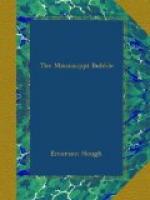“’Tis a face but blemished,” said she, slowly, the color rising to her cheek. “See! Here is the birth-mark of the house of Knollys. They tell me—my very good friends tell me, that this is the mark of shame, the bar sinister of the hand of justice. You know the story of our house.”
“Somewhat of it,” said Law.
“My brother is not served of the writ when Parliament is called. This you know. Tell me why?”
“I know the so-called reason,” replied John Law. “’Twas brought out in his late case at the King’s Bench.”
“True. ’Twas said that my grandfather, past eighty, was not the father of those children of his second wife. There is talk that—”
“’Twas three generations ago, this talk of the Knollys shortcoming. I am not eighty. I am twenty-four, and I love you, Catharine Knollys.”
“It was three generations ago,” said the Lady Catharine, slowly and musingly, as though she had not heard the speech of her suitor. “Three generations ago. Yet never since then hath there been clean name for the Banbury estate. Never yet hath its peer sat in his rightful place in Parliament. And never yet hath eldest daughter of this house failed to show this mark of shame, this unpurged contempt for that which is ordained. Surely it would seem fate holds us in its hands.”
“You tell me these things,” said John Law, “because you feel it is right to tell them. And I tell you of my future, as you tell me of your past. Why? Because, Lady Catharine Knollys, it has already come to matter of faith between us.”
The girl leaned back against the wall near which she had seated herself. The young man bent forward, taking both her hands quietly in his own now, and gazing steadily into her eyes. There was no triumph in his gaze. Perhaps John Law had prescience of the future.
“Oh, sir, I had far liefer I had never seen you,” cried Catharine Knollys, bending a head from whose eyes there dropped sudden tears.
“Ah, dear heart, say anything but that!”
“’Tis a hard way a woman must travel at best in this world,” murmured the Lady Catharine, with wisdom all unsuited to her youth. “But I can not understand. I had thought that the coming of a lover was a joyous thing, a time of happiness alone.”
“Ah, now, in the hour of mist can you not foresee the time of sunshine? All life is before us, my sweet, all life. There is much for us to do, there are so many, many days of love and happiness.”
But now the Lady Catharine Knollys veered again, with some sudden change of the inner currents of the feminine soul.
“I have gone far with you, Mr. Law,” said she, suddenly disengaging her hand. “Yet I did but give you insight of things which any man coming as you have come should have well within his knowledge. Think not, sir, that I am easy to be won. I must know you equally honest with myself. And if you come to my regard, it must be step by step and stair by stair. This is to be remembered.”




